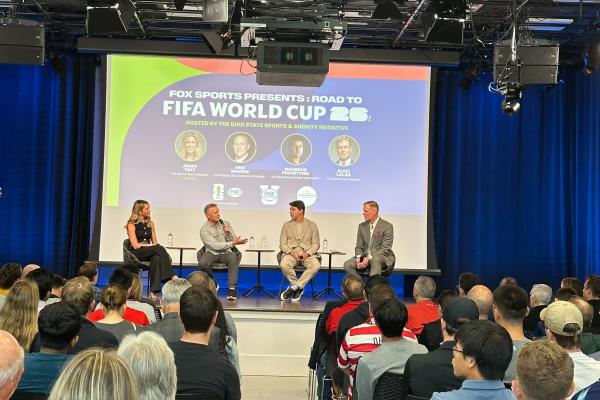FOX Sports Event Discusses Impact, Growth, and Future of American Soccer in Advance of 2026 World Cup in US

Watch the Video
by Reilly Cahill
The World Cup will be held in the United States in 2026, the first time in more than three decades, and Ohio State received a special preview from some of those closest to the American team.
U.S. Men’s National Team head coach Mauricio Pochettino, FOX Sports CEO and executive producer Eric Shanks and FOX Sports analyst and member of the National Soccer Hall of Fame Alexi Lalas joined FOX Sports host Jenny Taft for a World Cup conversation Aug. 29 at WOSU's Ross Community Theater, discussing the impact of the global tournament.
The capacity event that drew nearly 200 people was sponsored by Ohio State's Sports and Society Initiative in collaboration with FOX Sports, with the panel introduced by SSI Director, Dr. Nicole Kraft.
The World Cup field is expanding from 32 teams to 48, meaning new players and countries will have the opportunity to showcase their talents across 11 host cities in the U.S., Mexico and Canada from June 11 to July 19, 2026. Pochettino, named head coach of the USMNT in August 2024, said the expansion of teams and the 104 World Cup matches taking place across three countries could influence how future generations of soccer players in the U.S. view the sport.
“[It’s] a key factor to have the influence in the kids to start to also to see soccer in a different way,” Pochettino said. “Or similar to basketball, American football, hockey or baseball.”
Lalas said the U.S. team’s performance in the World Cup could reshape how the country views itself in the global soccer landscape.
“The opportunity is to change the way that we see ourselves when it comes to soccer, and ultimately, in a much more positive way,” he said.
Shanks spoke about the impact of U.S. players being able to represent their country in front of a global audience.
“Representing your flag is the greatest honor an athlete or a coach can have,” he said. “The next greatest honor is to be able to present it to the world.”
Since the World Cup has not been held in the U.S. since 1994, Shanks anticipates the country will embrace the excitement of the world’s best soccer players competing in cities from New York to San Francisco.
“I don’t think this country knows yet how big this is going to be,” Shanks said. “It’s going to take the country by storm. The fact that on July 4, we actually have World Cup games—one being played in Philadelphia—this country is going to go absolutely bonkers for this tournament.”
Shanks added that soccer will continue to grow in the U.S., in part due to the rise of Major League Soccer. With players such as Lionel Messi and Zlatan Ibrahimović joining MLS in recent years, the league’s growth has laid a foundation for continued interest in the sport.
“I do believe that a strong domestic league is a key component to how far we can eventually go and sustain our World Cup and international performance,” Shanks said. “Investment in the MLS is a great reason why we will continue to advance our World Cup hopes and dreams.”
As soccer has grown in popularity, its coverage has evolved as well. Lalas explained how the tone of soccer broadcasting has changed.
“There was a time where we would explain throw-ins and, for lack of a better term, dumb it down,” Lalas said. “We don’t do that anymore.”
The panel concluded with Lalas sharing his expectations for the tournament.
“It’s going to be a party of the likes of which you have never seen,” Lalas said.
